Japanese Dev Assistance: $2.5b for 4 projects

Bangladesh and Japan yesterday signed their 40th ODA deal involving $2.5 billion to implement four projects to boost ties between the two countries.
Economic Relations Division Secretary Monowar Ahmed and Japanese Ambassador to Bangladesh Hiroyasu Izumi signed the deal on behalf of their respective sides.
Prime Minister Sheikh Hasina and her Japanese counterpart Shinzo Abe witnessed the signing at the latter’s office.
The four projects, taken under the 40th Official Development Assistance (ODA) package deal, are Matarbari Port Development Project (1), Dhaka Mass Rapid Transit Development Project (Line 1), Foreign Direct Investment Promotion Project (II) and Energy Efficiency and Conservation Promotion Financing Project (Phase 2).
Earlier, Hasina arrived at the Japanese Prime Minister’s Office and held a bilateral meeting with Abe. On her arrival at the office, she was given a guard of honour.
Briefing reporters after the meeting, Foreign Secretary M Shahidul Haque said the PM put emphasis on advancing the Bangladesh-Japan relations to a “strategic level”.
She sought cooperation in extracting gas hydrate from seabed.
Both the prime ministers pledged to work together against terrorism and violent extremism at the national and international levels.
Hasina urged Abe to recruit skilled manpower from Bangladesh as his country introduced a new immigration law. She proposed opening a skill development institute in Bangladesh.
Responding very positively to the proposal, Abe said officials of the two counties would discuss the issue to make a decision.
The two leaders discussed ways to find a durable and early solution to the humanitarian and political crisis that has emanated from the displacement of over one million Rohingyas from Myanmar to Bangladesh.
Hasina said Japan understands that the solution to this crisis lies in the early, safe and dignified return of the displaced people to their homeland Myanmar.
She said it is necessary for Myanmar to create a conducive atmosphere in Rakhine for the return of the displaced people.
The PM thanked the Japanese government for its generous support to handle the crisis, and for its efforts to support early repatriation.
Speaking at a joint press meet, Hasina said they decided to strengthen mutual cooperation in international platforms to fight terrorism and violent extremism and to mitigate risk emanating from climate change, and ensure denuclearisation to keep children safe.
She said Japan occupies a very special place in the hearts of the people of Bangladesh. “The level of commitment that Japan has been showing since our independence in 1971 is truly remarkable.”
The PM said Father of the Nation Bangabandhu Sheikh Mujibur Rahman dreamt of making Bangladesh a prosperous country and his vision of development was greatly influenced by the development history of Japan.
“After more than 48 years since our independence in 1971, we can now confidently say that we are moving in the right direction to fulfill that dream. And it is reassuring to have Japan by our side always.”
Hasina said she and Abe agreed on several new ideas to strengthen cooperation between the two countries.
She said Bangladesh met all the criteria to graduate from the Least Developed Country category to a developing country and it has set a goal to become a developed country by 2041. “Prime Minister Abe has assured me that Japan will stand by Bangladesh and extend necessary support to reach that goal.”
The premier said their discussion was greatly focused on enhancing regional connectivity to harness the full potentials of the countries. Improving physical infrastructure would be a critical factor in establishing effective connectivity, she observed.
Hasina extended her warmest felicitations to Emperor Naruhito, members of the imperial family and the Japanese people on the joyous occasion of his enthronement.
She said she was deeply moved by the hospitality that the government of Japan has extended to her and her delegation.
Hasina invited her Japanese counterpart to attend the “Mujib Borsho” to be celebrated in 2020 and Abe accepted the invitation saying he would consider it positively.
Japan will contest the UN Security Council election in 2022, and Bangladesh will help the country in this regard.
Japan also extended its support to the Bangladesh candidate for the post of deputy director general of International Organization for Migration (IOM).
Bangladesh has nominated its foreign secretary for the post.
Hasina later joined an official dinner hosted by Japanese premier Abe at his Tokyo residence.



 For all latest news, follow The Daily Star's Google News channel.
For all latest news, follow The Daily Star's Google News channel.
Comments